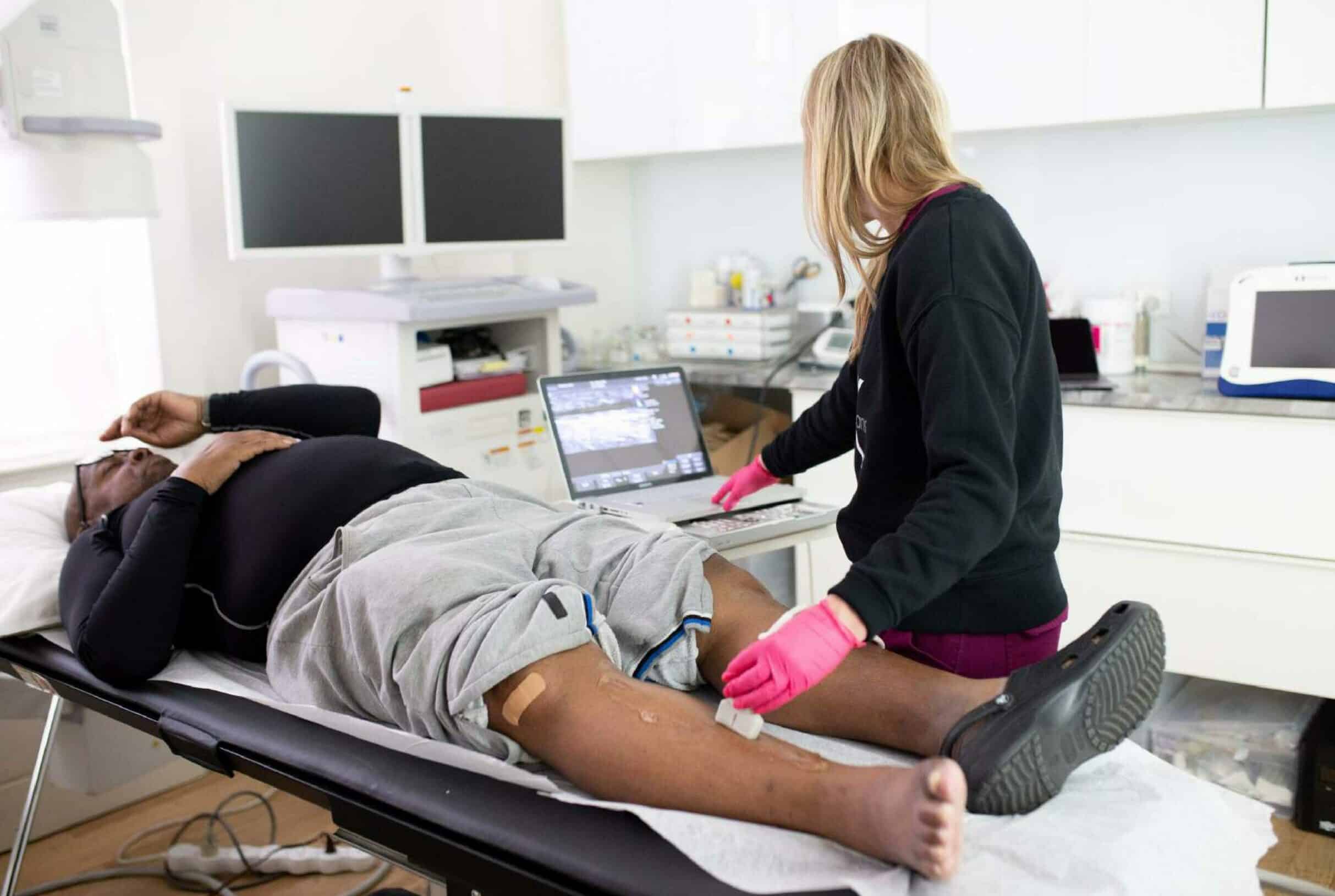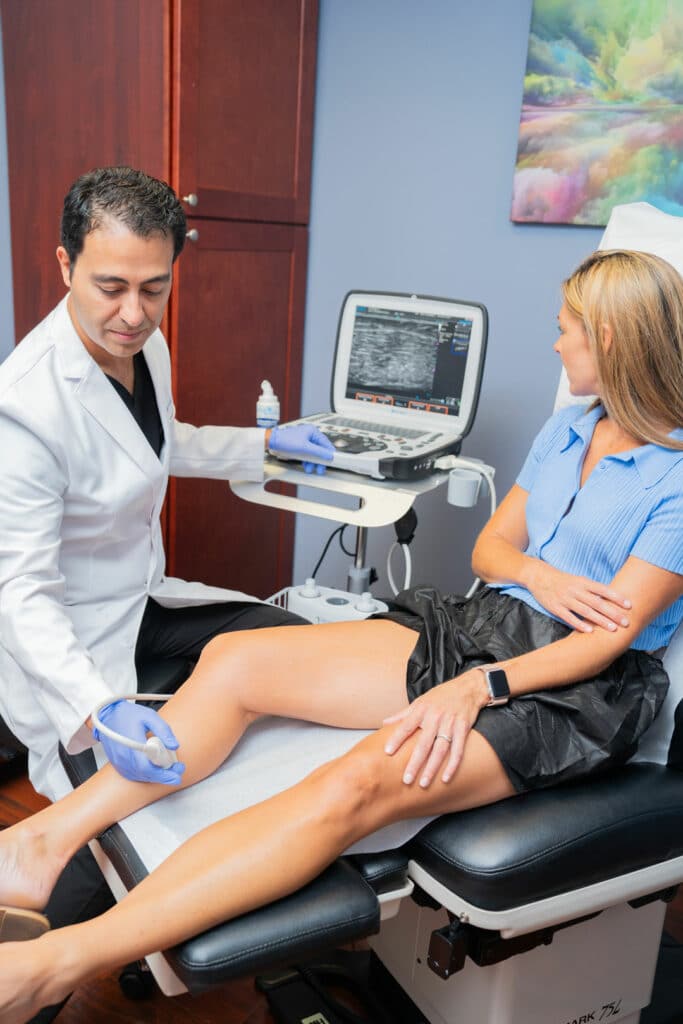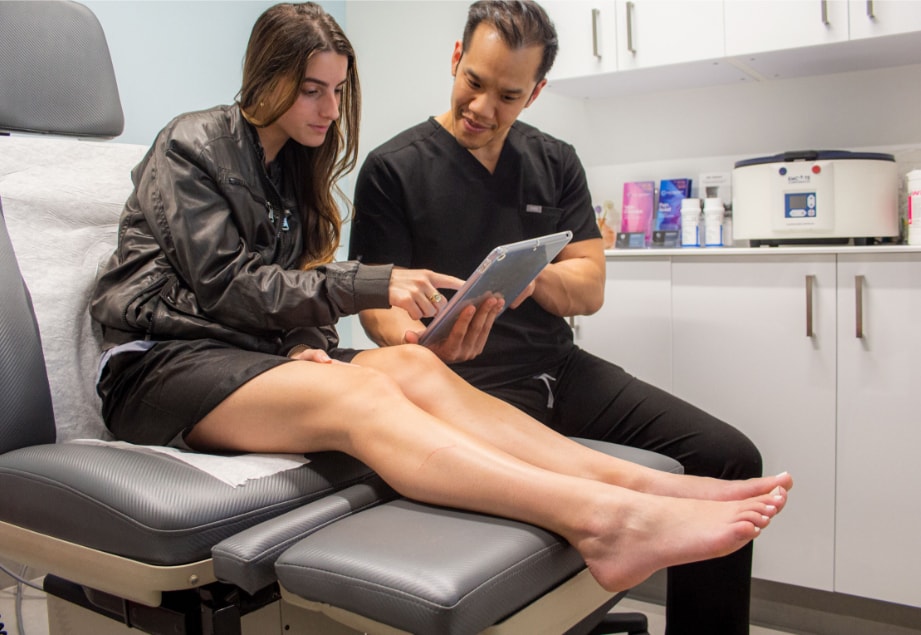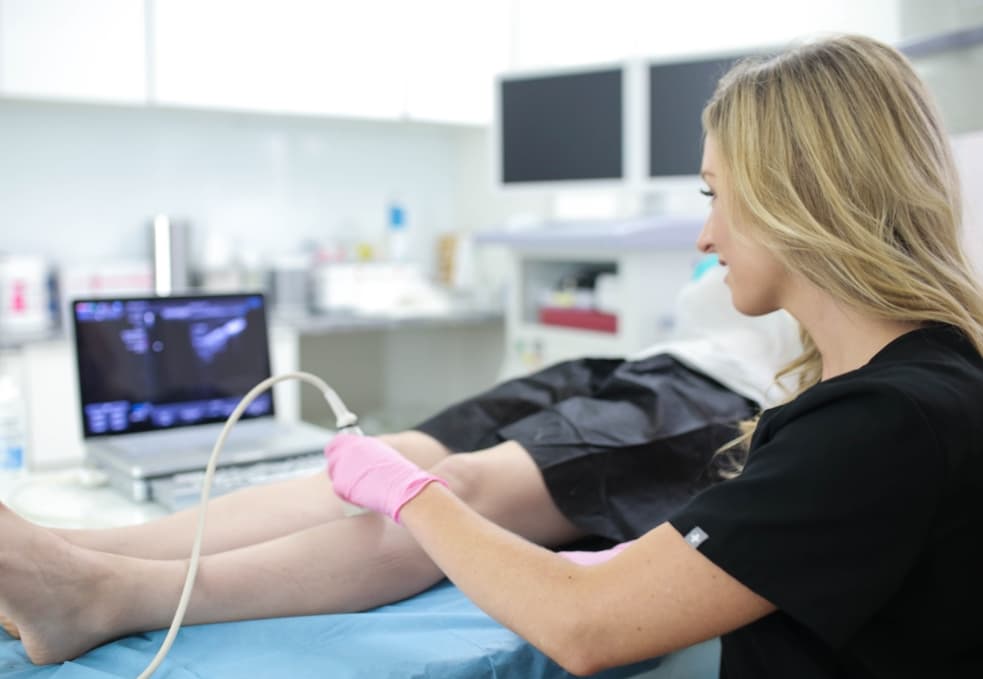What is Vein Ablation?
Vein ablation, also known as the endovenous ablation therapy of incompetent vein, is one of the most effective minimally invasive procedures for chronic venous insufficiency, the root cause of spider veins and varicose veins. Vein ablation involves using thermal or laser energy to destroy the diseased saphenous vein responsible for your vein problems. Most vein problems occur when your vein valves collapse and blood accumulates in the leg veins. Vein ablation destroys the diseased vein, thus allowing the accumulated blood to reroute into healthier leg veins. It’s a minimally invasive procedure that concludes within an hour and involves no downtime.
Vein ablation can be done using two techniques — radiofrequency ablation and laser ablation.

Endovenous Radiofrequency Ablation
Endovenous radiofrequency ablation involves using radiofrequency waves to collapse the diseased saphenous vein. The vein doctor uses a specialized catheter to generate radiofrequency waves that turn into thermal energy and irritate the walls of the diseased vein. The procedure is painless and comfortable, and there’s no downtime.
Endovenous Laser Ablation
Endovenous laser ablation involves using laser energy to destroy the diseased saphenous vein. The vein physician uses a specialized laser fiber connected to a catheter to generate laser energy, which destroys the diseased vein responsible for your vein problems. Endovenous laser ablation causes a little more post-treatment discomfort than radiofrequency ablation.
Your Vein Ablation in Maryland
Maryland Vein Clinic is a state-of-the-art vein clinic specializing in the latest and safest minimally invasive treatments in Maryland. We generally prefer the radiofrequency ablation procedure because it causes less post-treatment discomfort than laser ablation. In terms of effectiveness, both radiofrequency and laser ablation are equally effective.
Maryland Vein Clinic is one of the most accessible vein clinics in the National Capital Region. You can find our vein clinic at 10215 Fernwood Rd, Suite 301, Bethesda, Maryland, 20817, just outside of Washington, DC, in Silver Spring. If you have spider veins, varicose veins, or other symptoms of vein disease, please schedule an appointment today.
Before Vein Ablation
Vein ablation doesn’t involve extensive preparation. Your doctor may ask you to stop taking certain nonsteroidal anti-inflammatory medications (NSAIDs) and blood thinners, such as aspirin, a few days before your procedure. Blood thinners and NSAIDs increase the risk of bruising after vein ablation, so they should be avoided for a few days.
On the day of your procedure, you will be asked to wear comfortable, loose clothes or shorts. You will also have to remove all the jewelry in the treatment area during your vein ablation procedure. Please arrange to have someone drive you home after your vein ablation procedure. That’s all the preparation you need before vein ablation.
During Vein Ablation
Vein ablation is performed as a simple, in-office procedure in the vein doctor’s office. The vein doctor administers a local anesthetic to ensure optimal comfort. Once the local anesthetic kicks in, the vein doctor makes an incision on your skin’s surface. A catheter is driven through the incision under ultrasound guidance until it’s lodged inside the diseased saphenous vein.
Once the catheter is inside your diseased saphenous vein, the vein doctor delivers tumescent anesthesia to protect the surrounding tissues. The catheter is activated to generate thermal or laser energy, which irritates the walls of the diseased vein and makes it collapse. The accumulated blood reroutes into healthier leg veins to restore optimal blood circulation.
The entire vein ablation procedure concludes within 30 to 60 minutes.
After Vein Ablation
You can expect mild pain and discomfort after vein ablation. Your legs will be slightly sore and tender for up to two weeks. You can take over-the-counter pain medications to reduce swelling and discomfort. Your legs might look bruised and slightly discolored for a few weeks, but these side effects will gradually dissipate within a few weeks.
You will have to wear compression stockings for up to 4 weeks after vein ablation. Compression stockings reduce swelling and improve the recovery process. You must wear compression stockings 24/7 for the first week or two, following which you can reduce usage. Compression stockings should only be taken off while showering during the first week.
You can resume your daily activities and work immediately after vein ablation — there’s no downtime. However, you should have someone else drive you home after the procedure and avoid strenuous workouts, such as heavy lifting and running, for a week or two. You should also walk at least 30 to 60 minutes daily to improve blood circulation.
Your legs will feel considerably lighter and healthier after vein ablation. You will notice improvements in your leg swelling, leg pain, and leg heaviness. The varicose veins will gradually disappear over several weeks and months, depending on the size and density of the varicose veins. The results appear gradually over time.
Vein Ablation FAQs
How to reduce swelling after vein ablation?
You must wear compression stockings to reduce swelling after vein ablation. You must also elevate your legs above your heart’s level for 5 to 10 minutes at least thrice a day to improve blood flow towards the heart.
Can I see varicose vein removal before and after pictures?
We have performed thousands of varicose vein treatments. You can request the varicose vein removal before and after pictures from our team.
What are the radiofrequency ablation for varicose veins complications?
Radiofrequency ablation is an extremely safe procedure with a negligible risk of complications. However, in rare circumstances, patients may experience nerve injuries, infections, or blood clots in leg veins. We take all necessary precautions to prevent complications.
How long does vein ablation take?
The vein ablation procedure concludes within an hour.





